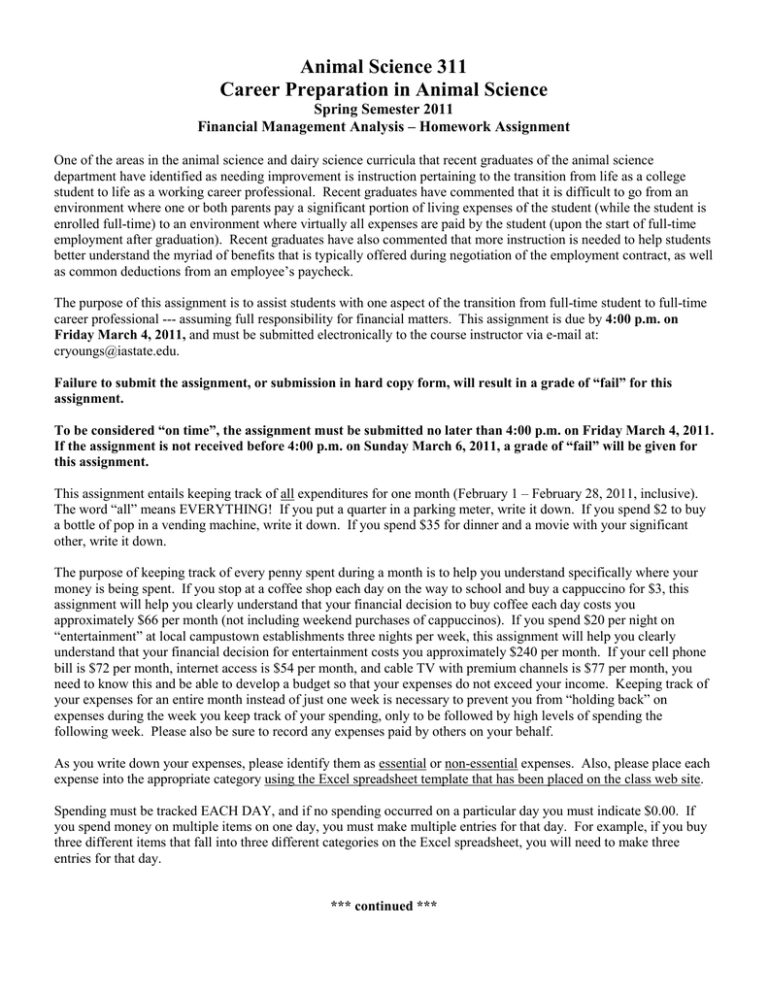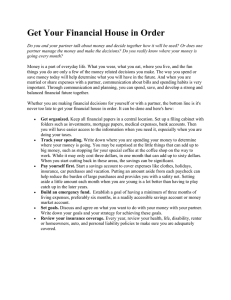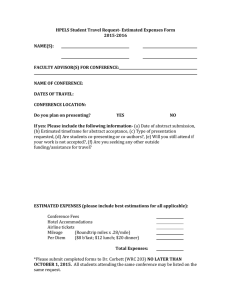Animal Science 311 Career Preparation in Animal Science Spring Semester 2011
advertisement

Animal Science 311 Career Preparation in Animal Science Spring Semester 2011 Financial Management Analysis – Homework Assignment One of the areas in the animal science and dairy science curricula that recent graduates of the animal science department have identified as needing improvement is instruction pertaining to the transition from life as a college student to life as a working career professional. Recent graduates have commented that it is difficult to go from an environment where one or both parents pay a significant portion of living expenses of the student (while the student is enrolled full-time) to an environment where virtually all expenses are paid by the student (upon the start of full-time employment after graduation). Recent graduates have also commented that more instruction is needed to help students better understand the myriad of benefits that is typically offered during negotiation of the employment contract, as well as common deductions from an employee’s paycheck. The purpose of this assignment is to assist students with one aspect of the transition from full-time student to full-time career professional --- assuming full responsibility for financial matters. This assignment is due by 4:00 p.m. on Friday March 4, 2011, and must be submitted electronically to the course instructor via e-mail at: cryoungs@iastate.edu. Failure to submit the assignment, or submission in hard copy form, will result in a grade of “fail” for this assignment. To be considered “on time”, the assignment must be submitted no later than 4:00 p.m. on Friday March 4, 2011. If the assignment is not received before 4:00 p.m. on Sunday March 6, 2011, a grade of “fail” will be given for this assignment. This assignment entails keeping track of all expenditures for one month (February 1 – February 28, 2011, inclusive). The word “all” means EVERYTHING! If you put a quarter in a parking meter, write it down. If you spend $2 to buy a bottle of pop in a vending machine, write it down. If you spend $35 for dinner and a movie with your significant other, write it down. The purpose of keeping track of every penny spent during a month is to help you understand specifically where your money is being spent. If you stop at a coffee shop each day on the way to school and buy a cappuccino for $3, this assignment will help you clearly understand that your financial decision to buy coffee each day costs you approximately $66 per month (not including weekend purchases of cappuccinos). If you spend $20 per night on “entertainment” at local campustown establishments three nights per week, this assignment will help you clearly understand that your financial decision for entertainment costs you approximately $240 per month. If your cell phone bill is $72 per month, internet access is $54 per month, and cable TV with premium channels is $77 per month, you need to know this and be able to develop a budget so that your expenses do not exceed your income. Keeping track of your expenses for an entire month instead of just one week is necessary to prevent you from “holding back” on expenses during the week you keep track of your spending, only to be followed by high levels of spending the following week. Please also be sure to record any expenses paid by others on your behalf. As you write down your expenses, please identify them as essential or non-essential expenses. Also, please place each expense into the appropriate category using the Excel spreadsheet template that has been placed on the class web site. Spending must be tracked EACH DAY, and if no spending occurred on a particular day you must indicate $0.00. If you spend money on multiple items on one day, you must make multiple entries for that day. For example, if you buy three different items that fall into three different categories on the Excel spreadsheet, you will need to make three entries for that day. *** continued *** If you live in a sorority, fraternity, or residence hall where you are charged per semester for living expenses, take the semester fee and divide by 4 to estimate the monthly cost. If someone else pays expenses on your behalf (such as automobile insurance, cell phone, medical insurance, car payment), please ask that person to give you an estimated monthly cost. Enter that estimate into the Excel spreadsheet. Before submitting the completed spreadsheet to the course instructor, delete the “examples” provided by the course instructor in the spreadsheet. Also, delete any columns representing items for which you had no expenses for the month (whether paid by yourself or others on your behalf). To receive a grade of “satisfactory” on this assignment, students must do the following: a) Tally the total monthly expenses within each spreadsheet category b) Tally the total monthly expenses classified as “essential” and “non-essential” c) Tally the total expenses for the month d) Identify three areas where you could potentially make some changes in the way you spend your money in order to reduce debt accumulation and/or begin investing for the future. All of the above information should be included in (embedded within) the completed spreadsheet submitted to the course instructor. For most students, this assignment is an eye-opening experience that helps them develop better spending and saving habits. As one noted financial advisor Dave Ramsey said, “Live like nobody else now [by saving and investing money] so that you can live like nobody else later [by having more money saved than you know how to spend].”



